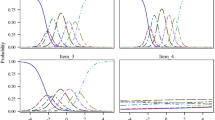Abstract
The Subjective Happiness Scale (SHS) constitutes an instrument for assessing subjective happiness. This study aims to present the validation of the SHS in a Portuguese adult population. A large representative sample (1,017 participants), from five different age groups was considered. Configurational invariance of the unidimensional structure of the scale was tested through multi-group confirmatory factorial analysis, and reliability and criterion-validity were investigated. The results support the single factorial structure and reliability of the SHS. Furthermore, the SHS correlated positively with the Satisfaction with Life Scale, thus supporting its criterion validity. Therefore, the Portuguese version of the SHS is a valid instrument to use with an adult Portuguese Sample.
Similar content being viewed by others
References
Abdallah, T. (1998). The Satisfaction With Life Scale (SWLS): Psychometric properties in and Arabic-speaking sample. International Journal of Adolescence and Youth, 7, 113–119.
Arbuckle, J. L. (2006). Amos (Version 7.0). Chicago: SPSS, [Computer Program].
Arrindell, W. A., Meeuwesen, L., & Huyse, F. J. (1991). The Satisfaction With Life Scale: Analysis of factorial invariance across sexes. Personality and Individual Differences, 35, 1255–1260.
Bentler, P. M. (1990). Comparative fit indexes in structural models. Psychological Bulleting, 107, 238–246.
Blais, M. R., Vallerand, R. J., Pelletier, L. G., & Briere, N. M. (1990). L’echelle de satisfaction de vie: Validation canadienne-francaise du “Satisfaction With Life Scale”. Canadian Journal of Behavioural Science, 21, 210–223.
Bradburn, N. M. (1969). The Structure of Psychological Well-Being. Chicago: Alpine.
Byrne, B. M. (2004). Testing for multi-group invariance using AMOS graphics: A road less travelled. Structural Equation Modeling, 11, 272–300.
Chen, F., Curran, P., Bollen, K., Kirby, J., & Paxton, P. (2008). An Empirical Evaluation of the Use of Fixed Cutoff Points in the RMSEA Test Statistic in Structural Equation Models. Sociological Methods and Research, 36, 462–494.
Diener, E. (1994). Assessing subjective well-being: Progress and opportunities. Social Indicators Research, 31, 103–157.
Diener, E., & Diener, M. (1995). Cross cultural correlates of life satisfaction self-esteem. Journal of Personality and Social Psychology, 68, 653–663.
Diener, E., Emmons, R. A., Larsen, R. J., & Griffin, S. (1985). The Satisfaction with Life Scale. Journal of Personality Assessment, 49, 71–75.
Dupuy, H. J. (1978) The research edition of the general psychological well-being schedule. unpublished manuscript.
Gouveia, V. V., Milfont, T. L., Nunes da Fonseca, P., & Peçanha de Miranda Coelho, J. A. (2009). Life Satisfaction in Brazil: Testing the Psychometric Properties of the Satisfaction With Life Scale (SWLS) in Five Brazilian Samples. Social Indicators Research, 90, 267–277.
Hu, L. T., & Bentler, P. (1995). Evaluating model fit. In R. H. Hoyle (Ed.), Structural Equation Modeling. Concepts, Issues, and Applications (pp. 76–99). London: Sage.
Hu, L., & Bentler, P. M. (1998). Fit indexes in covariance structure modeling: sensitivity to under parameterized model misspecification. Psychological Methods, 3, 424–453.
Hu, L., & Bentler, P. M. (1999). Cutoff criterion for fit indexes in covariance structure analysis: Conventional criteria versus new alternatives. Structural Equation Modeling, 6, 1–55.
Lyubomirsky, S., & Lepper, H. S. (1999). A measure of subjective happiness: preliminary reliability and construct validation. Social Indicators Research, 46, 137–155.
Marques, S. C., Pais-Ribeiro, J. L., & Lopez, S. J. (2007). Validation of a Portuguese Version of the Students’ Life Satisfaction Scale. Applied Research in Quality of Life, 2, 83–94.
McDonald, R. P., & Marsh, H. W. (1990). Choosing a multivariate model: noncentrality and goodness of fit. Psychological Bulletin, 107, 247–255.
Neto, F. (1993). The Satisfaction With Life Scale: Psychometrics properties in an adolescent sample. Journal of Youth and Adolescence, 22, 125–134.
Ryan, R. M., Little, T. D., Sheldon, K. M., Timoshina, E., & Deci, E. L. (1999). The American dream in Russia: extrinsic aspiration and well-being in two cultures. Personality and Social Psychology Bulletin, 25, 1509–1524.
Shimai, S., Otake, K., Utsuki, N., Ikemi, A., & Lyubomirsky, S. (2004). Development of a Japanese version of the Subjective Happiness Scale (SHS), and examination of its validity and reliability. Nippon Koshu Eisei Zasshi, 51, 845–853.
Swami, V. (2008). Translation and validation of the Malay Subjective Happiness Scale. Social Indicators Research, 88, 347–353.
Swami, V., & Chamorro-Premuzic, T. (2009). Psychometric Evaluation of the Malay Satisfaction With Life Scale. Social Indicators Research, 92, 25–33.
Swami, V., Stieger, S., Voracek, M., Dressler, S. G., Eisma, L., & Furnham, A. (2009). Psychometric evaluation of the Tagalog and German Subjective Happiness Scale and a cross-cultural comparison. Social Indicators Research, 93, 393–406.
Acknowledgments
This research was supported by FCT (Science and Technology Foundation), project PTDC/PSI/73347/2006.
Author information
Authors and Affiliations
Corresponding author
Rights and permissions
About this article
Cite this article
Spagnoli, P., Caetano, A. & Silva, A. Psychometric Properties of a Portuguese Version of the Subjective Happiness Scale. Soc Indic Res 105, 137–143 (2012). https://doi.org/10.1007/s11205-010-9769-2
Accepted:
Published:
Issue Date:
DOI: https://doi.org/10.1007/s11205-010-9769-2




